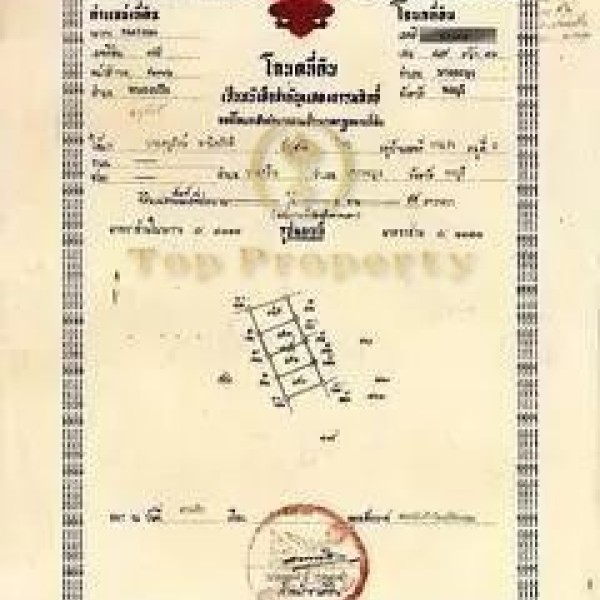What is Chanot and its types!
What is a Chanote and its Types When Purchasing Real Estate as a Foreigner in Thailand
Purchasing real estate in Thailand requires an understanding of the local laws and regulations, which differ significantly from Western standards. A key aspect of property ownership in Thailand is the documentation, particularly the Chanote. In this article, we’ll explain what a Chanote is, the different types of property ownership, and what foreigners should be aware of. We will also emphasize why purchasing land through a company is not recommended and what potential consequences this decision could entail.
What is a Chanote?
A Chanote (Nor Sor 4 Jor) is the official title deed in Thailand that confirms full ownership of a plot of land. It is the highest and most secure form of land ownership. The Chanote is issued by the Land Department and includes critical details:
1. Precise land boundaries: These are determined using GPS, eliminating disputes with neighbors.
2. Official registration: The document is issued and recorded in the Land Department’s database.
3. Legal transparency: It contains information on any restrictions, encumbrances, or mortgages tied to the land.
The Chanote allows the owner complete freedom to sell, lease, or transfer the land.
Other Types of Land Ownership
Apart from the Chanote, there are other forms of land ownership in Thailand that provide varying levels of security:
1. Nor Sor 3
This document certifies the right to use land but does not guarantee full ownership. Land boundaries are often loosely defined, which can lead to legal disputes.
2. Nor Sor 3 Gor
A more secure version of Nor Sor 3. The land’s boundaries are registered, reducing potential risks.
3. Sor Kor 1
An outdated type of document that only permits land usage. It is typically associated with agricultural land rather than for development or investment.
What Options are Available to Foreigners?
Foreigners face certain restrictions when it comes to land ownership in Thailand. However, there are legal and proven ways to invest in real estate:
1. Condominium Ownership (Freehold)
Foreigners can own condominium units outright under freehold ownership, provided the foreign quota (not exceeding 49% of the building’s total area) is not surpassed. This is the safest and most straightforward option for foreign investors.
2. Long-Term Land Lease (Leasehold)
A popular option for foreigners, especially for building villas. Land can be leased for up to 30 years with an option to renew for an additional 30+30 years.
- The lease agreement is registered with the Land Department, ensuring legal validity.
- While leasehold does not grant ownership of the land, it provides a stable basis for property development.
3. Inheritance of Property
Foreigners can pass their property (e.g., a condominium or leased land) to heirs, even if the heirs are also foreign nationals.
Why We Do Not Recommend Buying Land Through a Company
Although purchasing land through a Thai company may appear to be a workaround for foreign ownership restrictions, it carries significant risks and legal challenges:
1. Violation of the Law
Thai law prohibits foreigners from directly owning land. Establishing a company where 51% of shares are held by Thai nationals is often used as a loophole. However, if it is proven that the Thai shareholders are nominees, the structure can be declared illegal.
2. Potential Legal Consequences
In the event of a legal investigation:
- The land may be confiscated by the state.
- You could lose your investment without any entitlement to compensation.
- The company owner could face administrative and criminal charges.
3. Limited Control
Even if you own 49% of the company, the remaining 51% is controlled by Thai shareholders, leaving you vulnerable to potential loss of management and decision-making power.
4. Difficulties in Selling the Property
Selling land registered under a company involves corporate taxes, compliance with complex procedures, and approval from all shareholders. This can complicate the process and reduce the property’s appeal to prospective buyers.
5. Financial and Administrative Burdens
Registering a company, maintaining annual taxes, filing financial reports, and ensuring the company’s active status require ongoing financial and administrative efforts.
Recommendations for Foreign Investors
We strongly advise choosing legal and proven methods of owning property:
- Invest in condominiums under freehold ownership for reliable property rights.
- Consider long-term land leases for building villas.
- Consult with professional lawyers and reputable agencies before finalizing any transaction.
Conclusion
The Chanote is the most secure document for land ownership in Thailand, but foreigners must understand the legal limitations surrounding land ownership. While purchasing land through a company may seem like an attractive option, it is fraught with significant legal risks and financial burdens. To protect your investments and safeguard your property rights, opt for legal ownership methods and rely on professional advice and trustworthy strategies.
Join our  Telegram channel today – unlock personalized consultations and an exclusive assortment of property picks for living and investment from Phuket's trusted developers!
Telegram channel today – unlock personalized consultations and an exclusive assortment of property picks for living and investment from Phuket's trusted developers!

